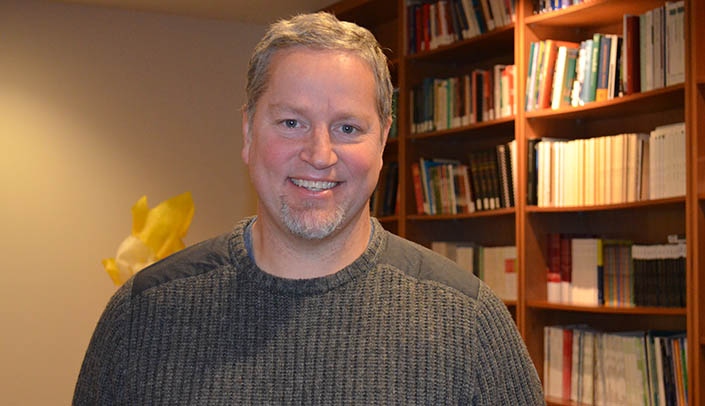UNMC has begun a digital diabetes prevention clinical trial that features a virtual interactive program that provides personalized guidance and weekly interactive lessons to encourage healthy habits. It is the largest-ever single-blind, randomized control trial of a digital diabetes prevention program (DDP).
To participate
For more information about the trial, contact Kathryn Wilson, Ph.D., research associate, social and behavioral health in the UNMC College of Public Health, by email or phone, 402-559-9375, or the study website.
Best yet, the program is accessible through personal electronic devices — computer, laptop, Smartphone and tablet — and it can link to a Fitbit or other fitness wearable devices. It combines proven behavioral science and the power of social networking with cutting-edge technology and world-class design.
The trial, called PREDICTS (Preventing diabetes with digital health and coaching for translation and scalability), is a collaboration between Omada Health, Wake Forest University in Winston-Salem, N.C., and UNMC.
Paul Estabrooks, Ph.D., the Harold M. Maurer Distinguished Chair for Health Promotion, Social and Behavioral Health in the UNMC College of Public Health, is co-investigator of the three-year study. He has led a number of large trials examining how diabetes prevention and weight management interventions can be implemented and taken to scale in community and clinical settings.
“This PREDICTS trial is unique in that participants get together as a group — but virtually — and engage in a year-long diabetes prevention program while also getting resources they can use when and where they want them,” Dr. Estabrooks said.
“We’re excited about this clinical trial and the ability to study how best to integrate effective, scalable preventive services, especially digitally-enabled ones, into typical clinical practice. In fact, we’ll be able to shed some light on strategies that will speed the translation of high-quality, research-tested diabetes prevention interventions into sustained clinical practice.”
Omada Health, based in San Francisco, is the leading provider of digitally-enabled intensive behavioral counseling that enables individuals at elevated risk of chronic conditions, like type 2 diabetes, to change habits that put them most at risk.
UNMC is in the process of enrolling approximately 500 participants who will be randomly assigned to either the digital Omada Program or a comparison group through UNMC’s current clinical practice that features a single two-hour in-person diabetes prevention class.
During the trial, UNMC will lead data collection and study the implementation process, while researchers at Wake Forest will be responsible for data system management, quality operational reports, evaluation, and analysis. Omada will run the experimental arm of the trial and provide engagement and outcome data for analysis.
In addition to tracking weight loss and reduction in A1c blood sugar levels, the PREDICTS trial also will track the impact of the Omada program on participants’ quality of life, stress levels, and health care use, among other measures. This will be the first time many of these measures are tracked in a randomized controlled trial of a digitally-delivered DPP.
Through the Omada platform, participants will have access to a personal coach, support group and weekly interactive lessons that provide information on healthy eating, nutrition, physical activity, stress and locking in healthier habits. The platform also provides ways to share information and chat with group members.

Congratulations, Dr. Estabrooks.